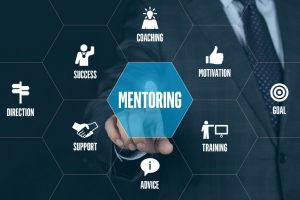Benefits of Mentoring
 Bill Fisher, a professor at the International Institute for Management Development (IMD), penned a thought-provoking blog for Harvard Business Review called “The End of Expertise.” Fisher attempts to explain the decline of expertise in a world where anyone can Google a keyword and stumble upon information. He uses an interesting formula from David W. Maister, et.al., focused on a trust equation, and ultimately posits that “being human” is the factor that will set experts apart from machine-based learning and information.
Bill Fisher, a professor at the International Institute for Management Development (IMD), penned a thought-provoking blog for Harvard Business Review called “The End of Expertise.” Fisher attempts to explain the decline of expertise in a world where anyone can Google a keyword and stumble upon information. He uses an interesting formula from David W. Maister, et.al., focused on a trust equation, and ultimately posits that “being human” is the factor that will set experts apart from machine-based learning and information.
I found this intriguing because I see this every day in the work we do with our clients at River as they build mentoring and social learning networks. It really is about who you know and who is willing to share what they know. Information can only get you so far. Having someone be able to put it into context is the key for moving from learning to deeper understanding—and from there to being able to apply it to your work.
The beauty of modern mentoring and social learning is that the networks we build are flexible and ever shifting. The expertise you can tap into is truly only limited by the quality of your network. By encouraging people to intentionally put effort into building a network that is broad, open, diverse, and constantly growing, we can help people find the expertise they need so that they can do their jobs.
Stop for a moment and think about a time when you felt completely uncertain of what to do next to complete a work task, or when you felt so overwhelmed by a new aspect of your job that you weren’t sure how to proceed. At times like this, it is hard to even be sure what questions to ask. And while you might be able to Google a term and find out some basic information on the topic at hand, you might not be asking the right question or digging into the topic deep enough to get to the correct solution.
 The human factor of mentoring, coaching, and social learning is the critical missing piece. While an amazing amount of information is available with an instantaneous search online, the deeper learning moment will still come from someone helping you put that learning into context and expanding your understanding beyond the simple facts.
The human factor of mentoring, coaching, and social learning is the critical missing piece. While an amazing amount of information is available with an instantaneous search online, the deeper learning moment will still come from someone helping you put that learning into context and expanding your understanding beyond the simple facts.
To help you get started with building a learning network (or to help you help other people build their networks), consider these factors that describe modern mentoring and social learning networks today:
- FLUID – Your network should always be in motion as you add new contacts to meet your evolving needs, and while you pause relationships with those who are not a good fit at this time (but who could be at a later date).
- FLEXIBLE – Your network should shift and change as your needs and abilities change so that it doesn’t grow stagnant. And don’t forget that your role in various relationships can change—you may be a learner today, but could be an advisor tomorrow.
- CROSS-FUNCTIONAL – Don’t limit yourself to people who are just in your field or department. Connect with people across different functions, roles, departments, and even companies and industries. This broad and diverse nature of connections can help you gain fresh perspectives.
- RECIPROCAL – Don’t just take from your network; give back to others by sharing what you have learned, experienced, attempted, failed at, succeeded at, and experimented with. You should also give back by being an advisor in situations where it makes sense so that your network is robust and multidimensional.
- TRANSFORMATIONAL – A healthy learning network should result in powerful change in the way you think, act, speak, and conduct business. You may also see profound changes in others who are a part of your network. But be mindful that you don’t just use the new terminology you are learning without actually changing your behaviors. Change needs to be more than skin deep.
Want to learn more about building learning networks? Download our How-to Guide for Creating Learning Networks today!








